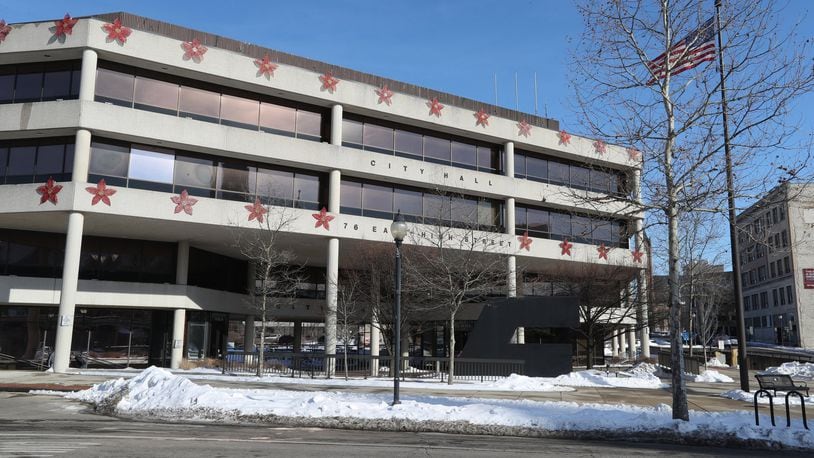RELATED: Board: LGBT discrimination exists in Springfield
The current ordinance prohibits discrimination based on race, religion, ancestry, sex, national origin, age and disability.
If approved, sexual orientation would be added to the ordinance. However it wouldn’t apply to portions of the ordinance that may affect “religious schools, churches engaged in religious activities and owner-occupied residences with not more than three unrelated renters,” according to the proposed legislation.
The specific language was included to not infringe upon religion to address the concerns of local residents, Estrop said.
“We did listen to people and their concerns about that and we’ve addressed that in this ordinance,” he said. “We’ve provided for the biggest concern people had and now it’s time to do what’s right and move forward.”
MORE: Springfield, Clark County commissioners to hold joint work sessions
Rue wants to clarify the word religious and add language to protect religious organizations that aren’t directly affiliated with a specific church but were started based on their belief of a holy text, he said.
“We’re still working on the ordinance,” Rue said.
A 2017 report from the city’s Human Relations Board said discrimination based on sexual orientation exists in Springfield and should be covered by local laws. The report recommended adding sexual orientation to the city’s non-discrimination ordinance.
In February 2012, commissioners voted 3-2 against amending the city’s anti-discrimination codes to include sexual orientation. The topic was debated for months before large crowds.
Commissioners Joyce Chilton and Kevin O’Neill and former Commissioner Dan Martin voted against the issue, while Mayor Warren Copeland and former Commissioner Karen Duncan voted in favor of adding sexual orientation to the anti-discrimination codes.
A group of residents opposed the amendment, including local churches and religious organizations. The opponents said evidence of specific cases of discrimination in Springfield couldn’t be produced.
The discussion has continued over the past five years at city commission meetings with Equality Springfield — a local lesbian, gay, bisexual and transsexual advocacy group — asking commissioners to reconsider it.
In 2014, the board began collecting data through surveys and public meetings to gauge discrimination in Springfield. The three most common concerns cited included racial discrimination, the north/south divide and LGBT discrimination.
MORE: 3 new Springfield commissioners, fire chief sworn into office
Since that time, gay marriage was legalized by the U.S. Supreme Court and an LGBT Pride Festival has been held in Springfield each of the past three years.
Both Estrop and Rue spoke out in support of adding sexual orientation to the city’s non-discrimination ordinance during a candidates night forum held before the election last fall.
Both Copeland and Estrop told the News-Sun they each plan to vote yes on the ordinance.
“I’m strongly opposed to discrimination and have worked by entire life against discrimination,” Estrop said. “It’s time we put those kinds of things behind us and do what’s right and make Springfield a community who welcomes all. We need to make sure all of our citizens stand equal before the law and are protected by that law.”
Rue also plans to vote yes at this point, he said, but the issue isn’t clear cut.
RELATED: Springfield commission at odds over landlord/tenant rights debate
“It’s a decision that you need to consider all citizens and all faiths,” Rue said. “It’s certainly not something I’ve taken lightly … There does need to be to equal protection. People shouldn’t be discriminated against based on how they live their life.”
Nothing has changed since the commission voted in 2012, O’Neill said. He hasn’t seen or heard of any court cases brought forward since that time, he said.
“I don’t want to send the message that I think we have a problem in Springfield because I don’t think we do,” he said. “I just don’t think (discrimination) is here.”
Chilton remains against the issue, saying it will burden small businesses with less than 15 employees who already follow state and federal regulations. Any changes should be made by the state, she said.
“It’s not the city commissioners’ responsibility to do this,” Chilton said.
MORE: Springfield-based food bank to re-examine distribution model
The community doesn’t have a problem but rather has a few board members who want to see the laws changed locally, Springfield resident Jason Stevens said.
“I know we have a new commission but we still don’t have any claims (in court) on the issue, zero,” Stevens said.
These types of ordinances don’t create equality before the law, said Aaron Baer, president of Citizens for Community Values. The organization advocates for public policy that reflects its Christian beliefs, according to its website.
“They put the government’s finger on one end of the scale and tip it in a direction that tends to scale against people of faith,” Baer said.
Springfield resident Jack Legg supports the ordinance, saying it doesn’t create special rights for people but equal protection under the law.
“In order to seek the welfare of the city, it’s important to make everyone welcome and everyone safe,” he said.
The religious exemption proves there’s discrimination in Springfield, said Rick Incorvati, a member of Equality Springfield and deacon at Christ Episcopal Church.
“Not all faith traditions believe the same thing about sexual orientation,” he said. “That exemption right there should tell us that there are communities that don’t want gay, lesbian and transgender people in there company … There’s a message sent to our gay, lesbian, transgender citizens when we don’t protect them. They’re not eager to stay in a place that says you’re at risk if you come out as gay, lesbian or transgender.”
3 QUICK NEWS-SUN READS
Clark County will examine cuts with projected $2M deficit in 2019
Clark County commissioners reject tax for new 9-1-1 center — for now
Clark County to recruit relatives, foster families due to drug crisis
Staying with the story
The Springfield News-Sun has written extensively about possible changes to non-discrimination laws since the issue was first debated in 2011.
About the Author
